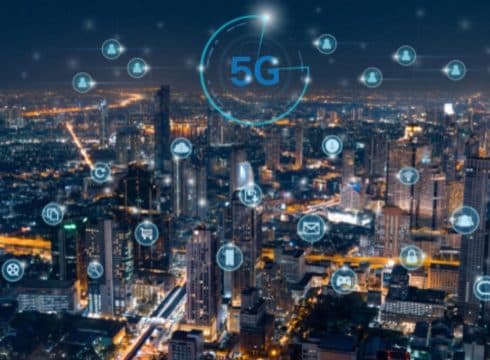5G increases the downloading and uploading speeds over the mobile network
IoT industry in India is expected to reach $9 Bn by 2020
A 2019 Ericsson report suggests that 5G will make inroads in India by 2022
Inc42 Daily Brief
Stay Ahead With Daily News & Analysis on India’s Tech & Startup Economy
With the Indian government planning to start 5G trials in the last quarter of the current fiscal, the talks regarding the new technology have become the new routine in the industry. Moreover, industry leaders have also started to believe that the early adoption of 5G will help India to become a global leader in cloud computing and internet-of-things (IoT).
Highlighting that 5G will bring revolutionary changes in tech enterprises, Balakrishnan Anantharaman, VP and MD of Sales, India and SAARC, Nutanix, told IANS that this new age technology will be the catalyst that will drive edge computing and IoT. “As increased speed and bandwidth will reduce the gap between wifi and cellular devices, edge computing will come into a realm of its own,” Anantharaman added.
5G or the fifth generation technology increases the downloading and uploading speeds over the mobile network. Moreover, by reducing latency, 5G offers a more stable network across connections.
According to a Nasscom report, the IoT industry in India is expected to reach $9 Bn by 2020. The applications of IoT are commonly found in telecom, health, automobiles, among other industries. Moreover, the report also predicts that the global IoT industry will touch the $300 Bn mark by 2020. While India’s share in this industry is very minuscule, the report suggested that India will have a 20% share of the IoT market in the next five years.
Sai Pratyush, additional vice president of product marketing-ICS at Tata Teleservices Limited (TTSL), said that the tech enterprise segment is turning to new-age technologies like IoT, artificial intelligence (AI), and cloud computing.
Focusing on the growth of IoT, Pratyush added that it is seen as a key driving force to improve operational efficiencies. “AI coupled with ubiquitous connectivity is enabling exponential value being generated by IoT. AI is seeing large scale adoption by enterprises owing to its power to aid automation, speed and better decision making,” Pratyush added.
5G To Propel AI-Driven IoT
With 5G becoming a reality, the technology is expected to push the innovation in other technologies as well. One of the use-cases of 5G which is expected to bring a substantial change in the IoT domain is AI-driven IoT technology.
According to Atish Gude, the chief strategy officer of NetApp, the advent of 5G is what AI-driven IoT has been waiting for. “2020 will see many players in the technology industry and business community invest in building edge-computing environments to support the reality of AI-driven IoT,” Gude added.
In India, the road to 5G isn’t clear yet. According to a 2019 Ericsson report, the 5G network will make inroads in India by 2022. However, to push the early adoption of 5G, the government has started to shift its focus to this new-age technology. Recently, IT minister Ravi Shankar Prasad in the Rajya Sabha said that the centre is finalising the framework for 5G technologies.
Moreover, the government has also reiterated its focus on 5G spectrum auctions, including 5G airwaves that are scheduled to be held by March 2020.
{{#name}}{{name}}{{/name}}{{^name}}-{{/name}}
{{#description}}{{description}}...{{/description}}{{^description}}-{{/description}}
Note: We at Inc42 take our ethics very seriously. More information about it can be found here.


